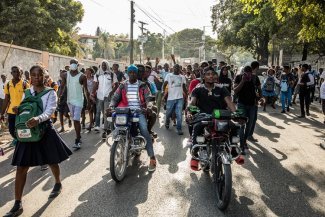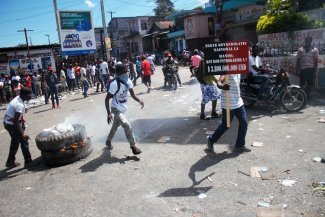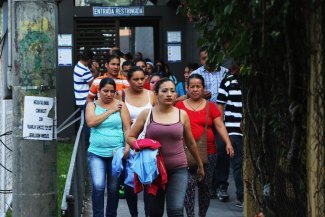
Not far from one of the entrances to the Parc Industriel Métropolitain (PIM), signs remain from recent demonstrations by textile workers’ organisations. In Creole, this banner calls for a minimum daily wage of 1,500 gourdes (about €13) and better working conditions.
It’s 6am and the air is already warm. As the day breaks, vendors begin to flood into the streets. The din of voices mingles with a cacophony of honking horns and music blaring from buses and vans. Hundreds of women and men, most of them very young, hurry into the buildings of the Parc Industriel Métropolitain, a free trade zone not far from the Port-au-Prince airport where several textile factories are located. Workers here are not allowed to arrive late to work, let alone miss a day. As Stéphanie, a textile worker in her thirties who did not wish to give her real name, explains, she and her co-workers are expected to arrive ahead of time.
“There are no jobs in the country, so we put up with it,” says a visibly dissatisfied Stéphanie. “I’m looking for a better job.” Stéphanie earns 9,000 gourdes (about €77) a fortnight if she doesn’t miss any days of work. She works six days a week, from 7am to 3pm. “The workers complain a lot about the rates and the supervisors mistreat us.” As Stéphanie explains, a rate is assigned to each operation carried out in the workshop, and wages are calculated according to the quantities to be delivered per day worked.
In February 2022, following a series of demonstrations, the daily minimum wage for the textile industry was increased from 500 to 685 gourdes (from about €4 to €6). Workers, however, were demanding 1,500 gourdes (about €13) per day. Banners calling for improved working conditions still hang outside the buildings, remnants of the demonstrations that took place here. Graffiti on the walls of company buildings and in the surrounding areas demanding wage increases attest to the perpetual dissatisfaction of workers, most of whom find themselves caught up in a system of subcontracting that drives prices down.
Trade union support
Workers and unions clearly considered this increase to be insufficient. The demonstrations were initiated by the Confédération des Travailleurs Haïtiens (CTH) and the Confédération des Travailleurs et Travailleuses des Secteurs Public et Privé (CTSP). Mobilisations such as these, as well as sit-ins and strikes, represent one of the unions’ primary tools for achieving better working conditions. The CTSP regularly joins forces with the Groupe Syndical des Travailleuses et Travailleurs du Textile Pour la Réexportation d’Assemblage (GOSTTRA) to advocate for the 57,000 workers in the textile sector.
In response to the security situation that workers face, the CTH and the CTSP jointly called for a major general strike from 1 to 2 February 2021. In May 2019, they teamed up to demand the reinstatement of dismissed union workers at the Compagnie de Développement Industriel (CODEVI) in the country’s north-east.
Such synergies are also a major part of trade union strategy. “We form a lot of alliances with farmers’ organisations, neighbourhood organisations and professionals groups such as lawyers. We come together to protest. We advocate for the fulfilment of workers’ demands,” says Jacques Belzin, president of the Confédération des Travailleurs Haïtiens.
Haitian trade unions are also working hard to ensure that workers know their rights.
“Sixty per cent of our financial resources are spent on training because, in order for someone to be able to defend their rights, they have to understand the mechanisms at play,” says Belzin. Jean Bonald Golinski Fatal, president of the CTSP, agrees: “Training initiatives are one of our top priorities and most important activities.” The confederations also conduct local and international awareness campaigns.
“We are one of the most internationally active trade unions in terms of the campaigns we conduct. When we talk to the Haitian authorities, they don’t listen to us. Instead, we conduct campaigns with individuals and organisations that lend us money so we can put pressure on local authorities,” says Fatal. In October 2020, the CTH and CTSP were among 82 national and international organisations from various sectors who called for an end to silence and international complicity, denouncing, among other things, the economic and political meddling to which Haiti has been subject for decades.
The trap of international outsourcing
The development of subcontracting for international companies began in the 1960s under the dictatorship of François Duvalier, who wanted to make Haiti the “Taiwan of the Caribbean”. Combined with trade agreements that facilitate the export of goods and are based on low labour costs, this economic model was primarily developed in the textile industry, which is dominated by American brands like Walmart, Gap, Target and Nike. The Haitian government created certain infrastructure such as la Société des Parcs Industriels (SONAPI), which is responsible for the Parc Industriel Métropolitain de Port-au-Prince and the CODEVI free zone, located on the border with the Dominican Republic, to establish factories and workshops.
“It was intended to be a transitional industry, generally used by countries that wanted to develop their economies, but no other industries have taken its place and we still have it,” says Clifford Apaid, vice-president of the Association des Industries d’Haïti (ADIH), which groups together employers in the textile industry, a sector with an annual turnover close to US$900 million.
“More than 90 per cent of production is destined for the North American market. A very small share goes to Europe,” he says.
“The biggest challenge we face is political instability. It affects workers as much as employers. Politically, we have been unable to develop stability,” says Apaid, who lists other difficulties such as recurrent fuel shortages and problems with customs. Indeed, Haiti is facing an unprecedented socio-political crisis, marked by rampant inflation, the devaluation of the gourde against the dollar, an increase in food insecurity affecting 45 per cent of Haitians and an increase in cases of kidnapping and attacks linked to gang wars.
For workers in the sector, soaring food prices are impoverishing households. Faced with global competition, however, their employers don’t want to increase their pay. Prior to the minimum wage increase in February 2022, the last wage adjustment took place in November 2019, even though the legal framework requires adjustments for every increase of at least 10 per cent in the rate of inflation, estimated at the time to be over 24 per cent.
The reform of the labour code at a standstill
The Haitian labour code dates from 1961 and was revised in 1984. Almost forty years after the last update, the document is out of step with changing social, political and economic realities. For several years, the state, employers and trade unions have been working to reform this essential piece of legislation. An inter-union commission has been set up to address the matter.
“It’s not applicable in its current form. Today we are in the consultative phase with other trade unions, the final phase,” says Belzin, who explains that the proposals of the three actors will be compared in order to produce a joint document to be submitted to the 51st legislature for adoption.
The assassination of President Jovenel Moïse on 7 July 2021 further aggravated the socio-political and economic crisis, which is marked by widespread and non-stop violence that has made it impossible to hold peaceful presidential and legislative elections. With the country currently operating with a transitional government and a parliament with only ten senators, it seems anything but certain that the necessary reforms will be implemented. In a joint report, the CTSP and the CTH have denounced the monopolisation of the public administration by corrupt politicians.
“The challenges are multiple and enormous,” says Jacques Belzin, citing as an example the fact that the State, which should play the role of regulator in order to harmonise labour relations between employers and workers, sometimes sides with the employers.
“So, you have two very powerful groups lined up against you,” he says, going on to explain that Conventions 87 and 98 on trade union freedoms and the right to organise and collective bargaining are not respected. “The non-application of the law is an additional difficulty [for us].” With respect to the security situation, Fatal adds: “It’s difficult to even demonstrate or go on strike.” Marching in the streets is risky because of shootings, armed attacks and kidnappings.
Obstacles prevent trade unions from fighting to increase the level of social protection for workers. “The level of social protection is very low. Only 4 per cent of workers have health and other forms of insurance,” says Fatal. Even though the CTH and CTSP have doubled their membership in four years, the low level of unionisation in Haiti represents a major concern.
Staying at the negotiating table
Union leaders say they are not yet satisfied with the results of their fight for better working conditions. “We work more and see fewer results,” says Jean Bonald Golinsky Fatal. Despite this, they have made some gains: in late April 2022, a collective agreement was signed with the Compagnie de Développement Industriel (CODEVI) in Ouanaminthe, in the north-east of the country, comprising 18 factories for 18,500 workers. It is the result of more than a year’s work by several unions, including Batay Ouvriye, the CTH and the CTSP. “The law says that when you sign an agreement in one factory, it’s applicable to all the other factories. This means that 18,500 people will benefit from the advantages offered by the collective agreement, advantages that they didn’t have before. This is a significant achievement,” says Jacques Belzin, president of the CTH.
Points of discussion included problems in the factories related to terrible hygiene conditions, sexual harassment of female workers and the arbitrary dismissal of union members. Fatal, also criticises work organisation. As he explains, “each worker performs a specific task. Workers are not given any added value. They are taught how to perform certain operations but they aren’t taught how to make a whole suit.” For Fatal, the situation in Haiti is far from anything resembling decent working conditions. Clifford Apaid of the Association des Industries claims that he continues to sit down with the unions to negotiate further agreements: “We are maintaining a dialogue with the unions.”
However, the most important demand remains that of better wages. As Belzin argues, even with the recent meagre increase, more than 80 per cent of workers don’t manage to meet the daily rate. As his colleague from the CTSP concludes: “To have a productive job, the work you do must be dignified and allow you to live on it, whereas the vast majority of workers receive precarious wages which do not allow them to live like human beings. As a result, the majority of these workers will end up living in the slums.”












